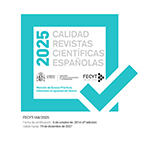Acompañando desde las trincheras: vivencias tras un año de ingreso mínimo vital
Resumen
El presente artículo nace de una construcción conjunta fruto de la experiencia compartida entre personas vulnerabilizadas atravesadas por las políticas públicas que han puesto en marcha la prestación del ingreso mínimo vital (IMV) —en tanto que solicitantes y/o perceptoras del mismo— y plataformas ciudadanas de defensa de los derechos ciudadanos que los han acompañado en el proceso. El IMV es una prestación dirigida a prevenir el riesgo de pobreza y exclusión social de las personas que carecen de recursos económicos básicos para cubrir sus necesidades básicas. Esta prestación está destinada a colectivos muy concretos y sujeta a una serie de requisitos. En conversación con las cofirmantes del artículo, las siguientes páginas ponen en el centro la necesidad de proponer una mirada que, más allá del marco normativo y los discursos mediáticos en torno a las políticas de rentas de inserción, se centre en los procedimientos administrativos y las prácticas burocráticas que conforman la gestión cotidiana de estas prestaciones, constituyendo disposiciones de apertura o cierre que condicionan el acceso a los derechos sociales. En tanto que el IMV se configura como un derecho subjetivo naciente, su puesta en marcha constituye un lugar privilegiado desde el que, precisamente, analizar el despliegue normativo y burocrático que lo acompaña, así como los usos políticos que de él se han hecho.
Descargas
Descarga artículo
Licencia
La revista Política y Sociedad, para fomentar el intercambio global del conocimiento, facilita el acceso sin restricciones a sus contenidos desde el momento de su publicación en la presente edición electrónica, y por eso es una revista de acceso abierto. Los originales publicados en esta revista son propiedad de la Universidad Complutense de Madrid y es obligatorio citar su procedencia en cualquier reproducción total o parcial. Todos los contenidos se distribuyen bajo una licencia de uso y distribución Creative Commons Reconocimiento 4.0 (CC BY 4.0). Esta circunstancia ha de hacerse constar expresamente de esta forma cuando sea necesario. Puede consultar la versión informativa y el texto legal de la licencia.











